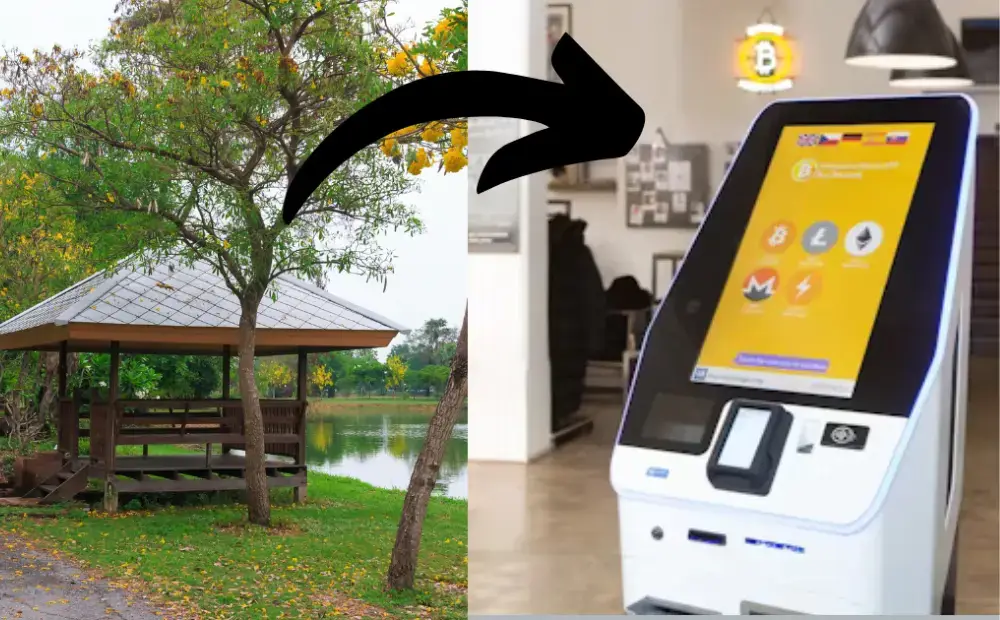The days of handling every transaction manually are fading fast. If long queues hold up your counters and staff can’t keep up, it’s time to automate. Kiosk machines streamline service, reduce wait times, and enhance customer satisfaction. And you don’t need extra staff for it.
This guide explains kiosk machines, how they work, and the key types available. It also explains where they deliver the highest return on investment (ROI) and when you need to get one. This guide is for you if you’re exploring self-service tech for your business.
What Is a Kiosk? (Literal Meanings + Evaluation)
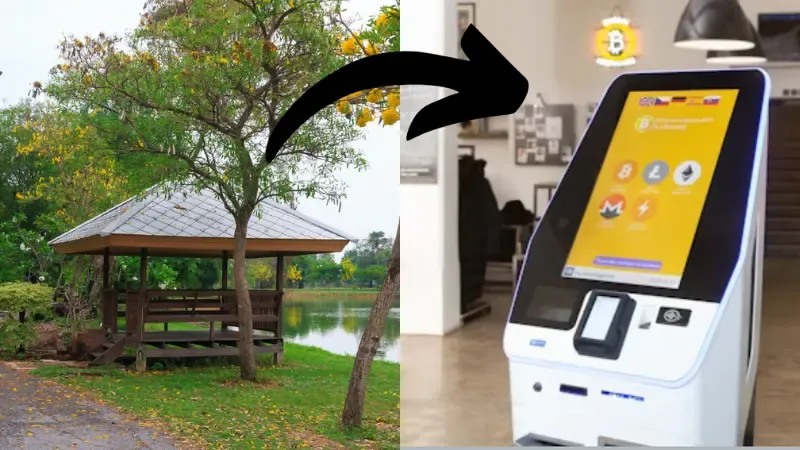
The word “kiosk” comes from the French kiosque and Turkish köşk. It literally refers to a small open pavilion often found in gardens or public places.
Over time, European cities widely adopted the word to describe different selling booths. Today, a kiosk refers to any small, stand-alone structure used for retail or service purposes.
A kiosk machine is different. It’s a digital unit with a screen, scanner, and printer. It enables users to complete tasks independently without requiring staff assistance.
In short:
Kiosk = physical booth or structure
Kiosk machine = self-service digital terminal
Evolution From Booth to Touchscreen
Kiosks originated as ornamental pavilions and then evolved into staffed vendor booths in cities.
With touchscreen tech rising in the early 2000s, they went fully digital.
Now, they handle check-ins, payments, and more, cutting wait times and labor costs.
What Does “Kiosked” Mean?
“Kiosked” is slang for being redirected to a self-service machine instead of a person. In business, it often means automating a process.
For instance;
“We’ve kiosked our ticketing system.”
Inside a Kiosk Machine (Hardware, Software, and System Design)

These machines are self-service stations with built-in logic, connectivity, and integration features. They handle end-to-end payments, data sync, and customer interaction.
Core Components That Power a Kiosk Machine
Every kiosk machine runs on a combination of physical and digital systems:
- Hardware: Most include a touchscreen. Add-ons like scanners, printers, and card or cash readers manage customer input and output.
- Software: Kiosks run a custom OS or a locked version of Windows, Android, or Linux. These systems host apps built for specific tasks, such as ordering, ticketing, or account access.
- Connectivity: Most units connect through WiFi, Ethernet, or cellular networks. Remote updates, monitoring, and analytics rely on stable internet access.
Features That Shape the User Experience
The most effective kiosk machines are built around user interaction and operational needs.
- Kiosk Mode: Locks the interface to prevent unauthorized access or switching to other apps.
- UX/UI Design: Clear visuals, large buttons, and guided flows reduce confusion and speed up transactions.
- Digital Signage: Idle screens often serve as dynamic ad space or instructional displays.
Integrations That Make It Business-Ready
Kiosks become more valuable when they sync with your backend systems:
- Connect with POS, CRM, or ERP tools to manage sales, customer data, or inventory.
- Support for loyalty programs, QR codes, or RFID cards allows personalized service.
- Features like screen readers and multilingual options make kiosks accessible to more users.
Types of Kiosk Machines (With Real Examples)
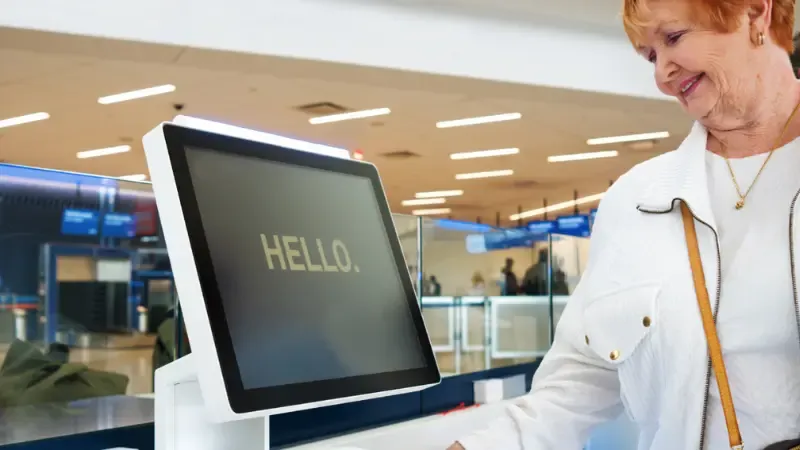
Kiosks come in many forms, each built to solve a specific task with speed, accuracy, and minimal staff effort. Below are the most common types used across industries.
Information Kiosks
These kiosks help people find answers fast.
You’ll see them in:
- Airports: Flight schedules, terminal maps
- Hospitals: Department locations, appointment queues
- City Centers: Public notices, tourist guidance
They reduce pressure on staff and improve access to timely information.
Self-Service Kiosks
A self-service kiosk allows users to complete actions without needing to speak with staff.
Common use cases include:
- Fast-food chains (e.g., McDonald’s): Order and pay on-screen
- Movie theaters: Buy or collect tickets
- Hotels: Quick check-in, room card printing
They boost efficiency, reduce lines, and help businesses serve more people at once.
Payment Kiosks
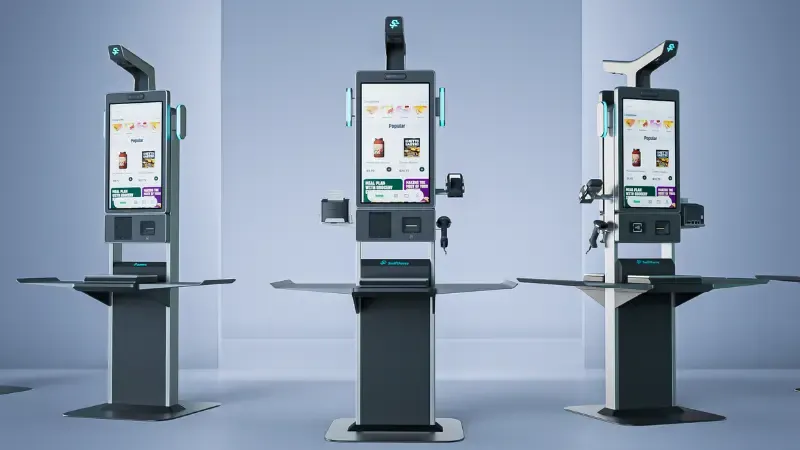
Payment kiosks are built purely for secure transactions.
You’ll find them in:
- Retail stores: Self-checkout counters
- Mobile shops: Recharge and bill pay stations
- Utilities: Bill collection points in public areas
They connect to payment gateways, verify input, and issue receipts instantly.
Wayfinding / Directory Kiosks
You’ll spot these in large, complex spaces.
Their job is to guide people through:
- Shopping malls: Store directories, floor plans
- University campuses: Department maps, events
- Corporate buildings: Visitor check-in, meeting room guides
They improve navigation and reduce confusion in high-traffic areas.
Interactive Multimedia Kiosks
These are used for deep user engagement.
They display:
- Product demos
- Touch-based learning content
- Surveys or feedback tools
Brands use them at expos, museums, and lobbies for attention-grabbing experiences.
Custom Business-Specific Kiosks
These are tailored systems that come with multiple built-in tools.
For example:
- QSRs: Order-taking, loyalty signup, real-time promotions
- Government offices: ID renewal, ticket generation
- Healthcare: Check-in, payment, and records access in one unit
These setups reflect the business model and workflow, not just surface-level use.
Where Are Kiosks Used? Industry Applications
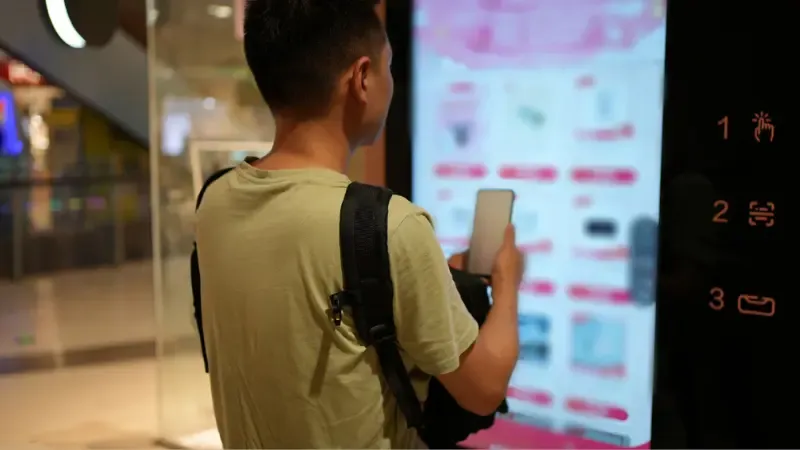
Go to a supermarket and you will spot a Kiosk in almost every shop. They save time and reduce staffing pressure. And deliver fast, reliable service in high-traffic settings.
Retail Environments
Retailers use kiosks to bridge online and in-store shopping.
Key applications:
- Endless aisle: Let customers browse and order out-of-stock items
- Inventory lookup: Check real-time availability without staff
- Digital catalogs: Explore full product lines on-screen
These kiosks increase sales while freeing up floor staff to focus on other tasks.
Restaurants and QSR Chains
Speed is one of the most important factors in running a successful food business.
That’s where business owners need a kiosk to cut wait time and reduce manual entry errors. Once the order is placed, it is sent directly to the kitchen. It automates the queue and enhances order accuracy.
Kiosks also suggest combos or add-ons during checkout. It significantly increases the average order value for restaurants. The shopkeepers also use the kiosk to advertise their offers.
Transportation Hubs (Airports, Stations)
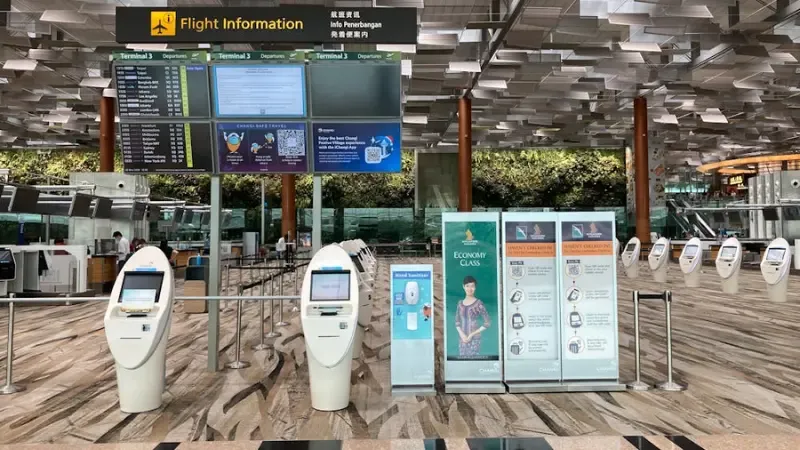
High-traffic areas rely on kiosks to streamline movement.
You’ll find them used for:
- Ticketing and check-in: Skip counters with fast ID scans
- Flight or train info: Real-time updates and gate directions
- Baggage tag printing: Reduce bottlenecks at service desks
Travelers get control, and staff stay unburdened.
Government & Public Sector
Governments use kiosks to manage high-volume public services with less congestion. You’ll find them at DMV offices for check-ins and managing the waitlist. They are also present at terminals for license renewals or permit applications.
These machines help reduce queues and offer 24/7 access to essential services.
Healthcare & Education
Hospitals and institutions utilize kiosks to streamline check-ins and manage data flow.
Common uses include;
- Patient or visitor check-in
- Access to medical or academic records
- Tuition payments or service requests
They protect privacy and reduce front-desk workload.
Events, Venues & Exhibitions
Kiosks improve the event experience from registration to navigation.
Guests can register on-site, and print their badges instantly. They can also use kiosks for venue maps or event schedules.
Organizers also use them to power sponsor booths. It offers interactive games or branded content that draws attention and captures leads.
Why Businesses Are Adopting Kiosk Machines
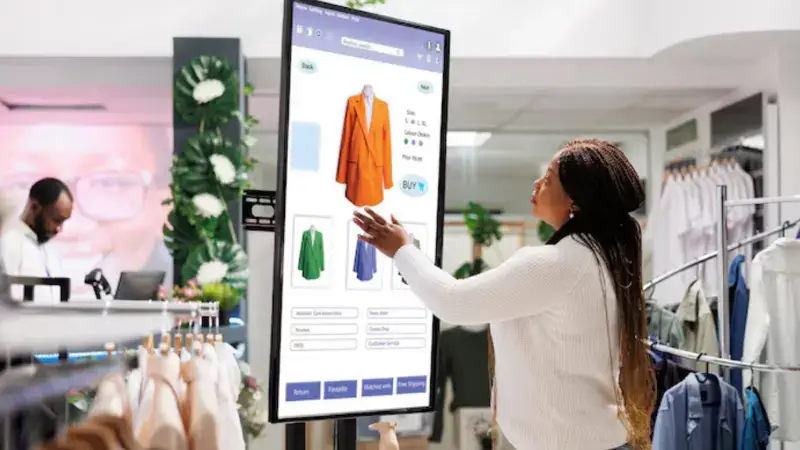
There are tens of reasons businesses prefer kiosk machines over traditional checkouts.
But these 4 reasons are most prominent;
- Labor Efficiency & Cost Reduction
Kiosks take over simple, repetitive tasks that drain staff time. Businesses reduce headcount pressure and cut operating costs. This enables teams to focus on higher-value work.
The McKinsey report states that automation can reduce operational costs by up to 30%.
- Increased Speed and User Satisfaction
Kiosks shorten lines and speed up service. They guide users with clear steps and fast responses.
People get what they need quickly, with fewer mistakes and less frustration.
Various social research reports concluded that customers value quick service over human interaction.
- Always-On Service Availability
Kiosks stay available around the clock. Customers can order, pay, or check info anytime. Businesses serve more people without needing more staff or longer hours.
If you serve in a high-traffic area, then a kiosk can increase your customer reach by up to 40% (Frost & Sullivan Study).
- Enhanced Data Collection & CRM Integration
Kiosks track user actions and capture useful data. They sync with CRMs, loyalty systems, and apps. This helps businesses identify behavioral patterns and refine future offers or services.
Considerations Before Investing in Kiosk Machines

There is no doubt that a kiosk machine would be a wise investment for your business. But you still need to consider the following;
Maintenance, Support, and Uptime Needs
Kiosks need to remain operational. Downtime affects customer trust and operations.
Look for:
- Remote troubleshooting and software updates
- Quick access to replacement parts
- Warranty and technical support coverage
- Routine maintenance options to prevent failures
Security and Compliance
Kiosks collect payments and personal data. You must protect both hardware and software.
Make sure your setup follows:
- Payment Card Industry Data Security Standard (PCI-DSS)
- Americans with Disabilities Act (ADA) for accessibility
- General Data Protection Regulation (GDPR) for data privacy
Also, secure the kiosk unit itself to prevent tampering.
Customization and Scalability
Your first kiosk may not be your last. Select a system that evolves with your growth.
- Modular hardware lets you add features later.
- Software should allow updates without requiring a complete restart.
- Ensure the design aligns with your brand and workflow.
- Look for systems that can scale across locations.
Potential Challenges
You’ll face some challenges even after installing the perfect kiosk for your business. Some challenges include;
- Some users may avoid or misuse the system.
- Customers with low-tech confidence may need help.
- Kiosks in public areas face damage, theft, or vandalism.
Mitigate these risks with staff support, user training, and tamper-proof hardware.
What Makes Info Kiosks So Powerful?
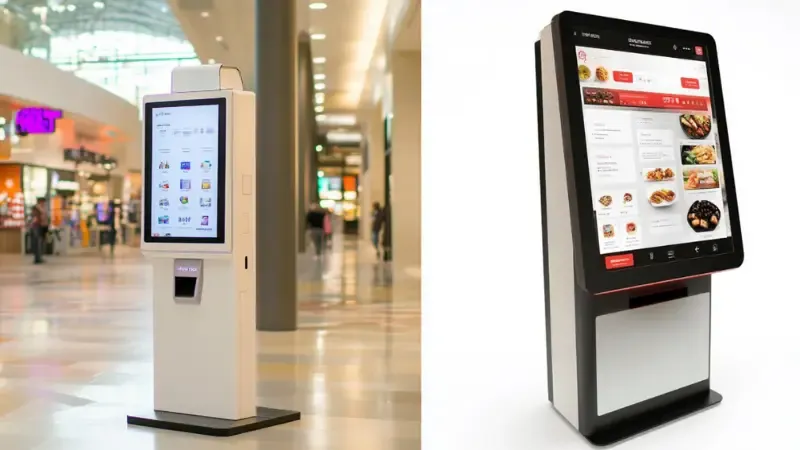
Information kiosks offer clear assistance without requiring staff. They guide visitors, share live updates, and work 24/7. Their main job is to inform and support quick decisions in busy public spots.
Key Places They Excel
Info kiosks are suitable for both public and private environments. You’ll often find them in:
- Museums and galleries: for exhibit guides and interactive learning
- University and corporate campuses: for maps, schedules, and visitor help
- City parks and public buildings: for events, rules, and emergency info
- Hotel lobbies and event halls: for check-in details and navigation
- Exhibitions and trade shows: for booth directories and session schedules
Must-Have Hardware & Software
A kiosk is a full package for business owners. Here is what they contain;
- Touch-based navigation with large, accessible interfaces
- Real-time data feeds (weather, transport, wait times, etc.)
- Multilingual support for a wider audience reach
- Assistive features for visually and physically impaired users
- Cloud-based updates to keep content fresh and relevant
Info kiosks don’t sell or process. They guide, answer, and simplify public interactions.
Should You Buy or Lease a Kiosk? Key Factors for Your Business

The choice between buying or leasing a kiosk machine depends on your business needs and budget.
But here’s what you should know;
Industries with the Best ROI
Retail, hospitality, healthcare, and public services benefit most from kiosks. These sectors see faster customer flow, reduced labor costs, and better service experiences.
Understanding Costs
Kiosk costs cover hardware (buy or lease), software licenses, and ongoing support. Some pay upfront, while others opt for monthly or subscription plans.
Buying vs. Leasing
Owning a kiosk means higher upfront costs, but it offers full control and no recurring fees. Leasing lowers initial expenses and eases upgrades, but may increase total cost over time. Leasing also helps with cash flow and technology refreshments.
Custom vs. Off-the-Shelf
Custom kiosks fit unique branding and operational needs but cost more and take longer to deploy. Off-the-shelf units are faster and cheaper but less flexible.
FAQs About Kiosk Machines
What is the total cost of a kiosk machine, including setup and support?
Basic units start at $2,000–$3,000. Advanced models with peripherals, software, and ongoing support can exceed $10,000. Setup, warranties, and cloud access may come as add-ons or subscriptions.
Can kiosk machines be customized to meet our industry’s specific needs?
Yes, kiosks are modular. You can customize hardware, such as printers, scanners, and payment systems. You can also customize Software, including apps, UI, and integrations. This allows you to fit kiosks to tasks, from healthcare check-ins to restaurant ordering.
What are the connectivity and power requirements for a kiosk machine?
Most kiosks run on standard AC power and support Wi-Fi, Ethernet, or cellular connections. Backup options, such as battery or offline modes, are available for critical environments.
How secure are kiosk machines for handling payments or sensitive data?
Kiosks use encrypted payment modules and meet PCI compliance standards. You can also add user authentication, session timeouts, and physical locks for extra security.
What kind of maintenance or technical support do kiosks need?
Look for models with remote monitoring, self-diagnostics, and fast part replacement. Vendors often offer SLA-backed support to ensure uptime and reduce manual troubleshooting.
Final Thoughts: Kiosks Aren’t the Future … They’re the Present
Kiosk machines are already changing how businesses connect with customers.
They’re used in nearly every industry, from retail to healthcare. Their fast and reliable service, available around the clock, makes them vital digital touchpoints today.
If you want to simplify operations and improve user experience, a kiosk is a smart choice.
Looking to enhance your customer experience?
Explore our custom kiosk solutions built for your business—scalable, reliable, and fully tailored.
Contact our team today to find the right fit for your needs.

